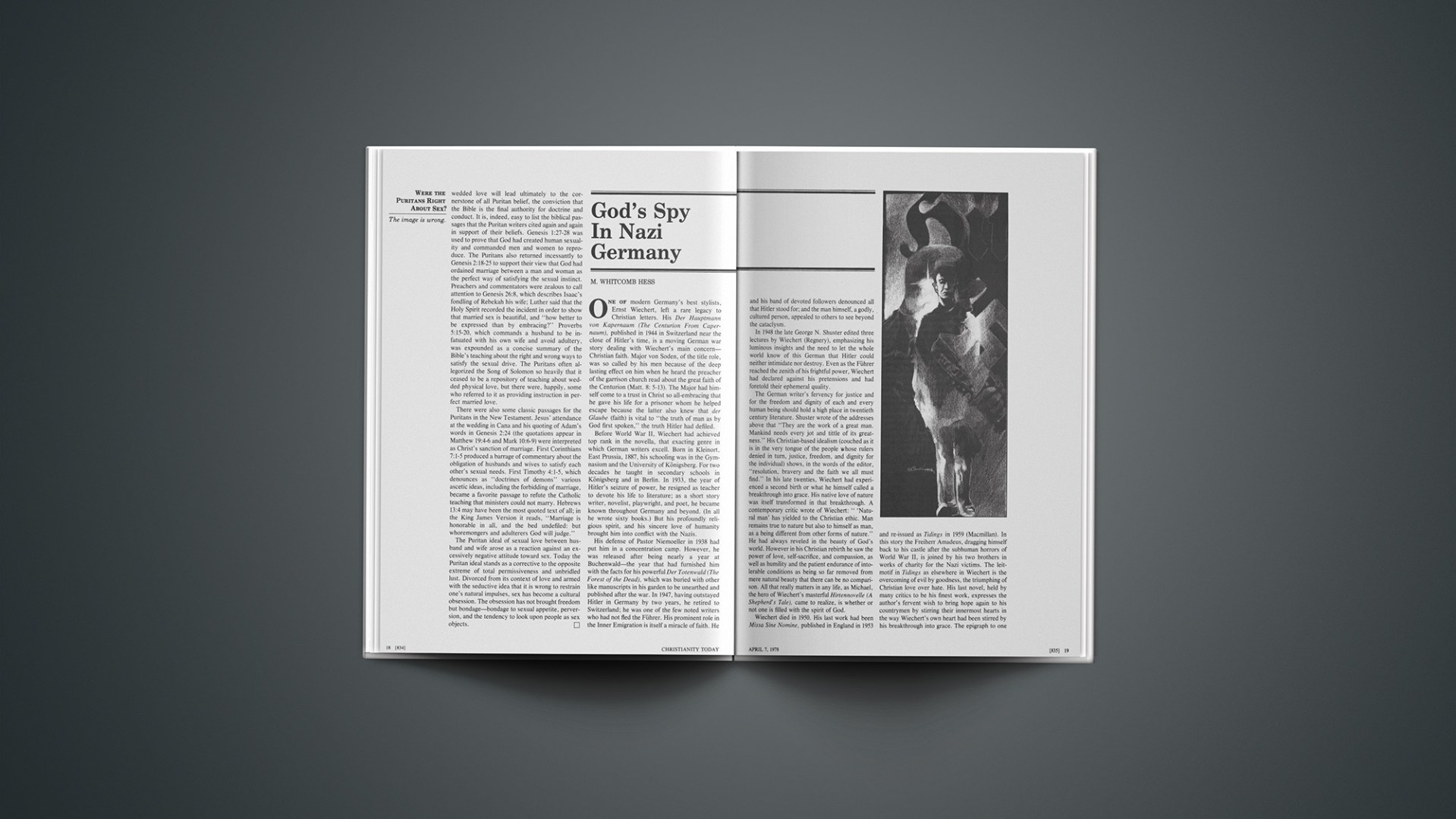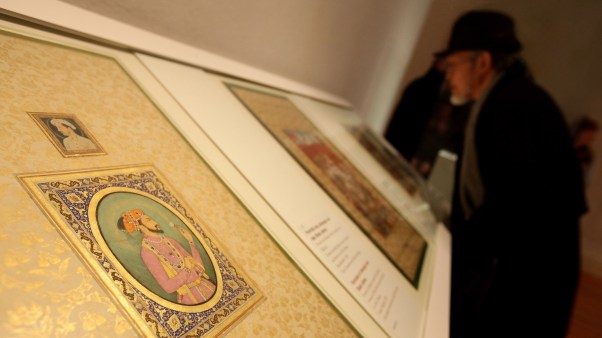Wiechert had faith like the Centurion.
One of modern Germany’s best stylists, Ernst Wiechert, left a rare legacy to Christian letters. His Der Hauptmann von Kapernaum (The Centurion From Capernaum), published in 1944 in Switzerland near the close of Hitler’s time, is a moving German war story dealing with Wiechert’s main concern—Christian faith. Major von Soden, of the title role, was so called by his men because of the deep lasting effect on him when he heard the preacher of the garrison church read about the great faith of the Centurion (Matt. 8:5–13). The Major had himself come to a trust in Christ so all-embracing that he gave his life for a prisoner whom he helped escape because the latter also knew that der Glaube (faith) is vital to “the truth of man as by God first spoken,” the truth Hitler had defiled.
Before World War II, Wiechert had achieved top rank in the novella, that exacting genre in which German writers excell. Born in Kleinort, East Prussia, 1887, his schooling was in the Gymnasium and the University of Königsberg. For two decades he taught in secondary schools in Königsberg and in Berlin. In 1933, the year of Hitler’s seizure of power, he resigned as teacher to devote his life to literature; as a short story writer, novelist, playwright, and poet, he became known throughout Germany and beyond. (In all he wrote sixty books.) But his profoundly religious spirit, and his sincere love of humanity brought him into conflict with the Nazis.
His defense of Pastor Niemoeller in 1938 had put him in a concentration camp. However, he was released after being nearly a year at Buchenwald—the year that had furnished him with the facts for his powerful Der Totenwald (The Forest of the Dead), which was buried with other like manuscripts in his garden to be unearthed and published after the war. In 1947, having outstayed Hitler in Germany by two years, he retired to Switzerland; he was one of the few noted writers who had not fled the Führer. His prominent role in the Inner Emigration is itself a miracle of faith. He and his band of devoted followers denounced all that Hitler stood for; and the man himself, a godly, cultured person, appealed to others to see beyond the cataclysm.
In 1948 the late George N. Shuster edited three lectures by Wiechert (Regnery), emphasizing his luminous insights and the need to let the whole world know of this German that Hitler could neither intimidate nor destroy. Even as the Führer reached the zenith of his frightful power, Wiechert had declared against his pretensions and had foretold their ephemeral quality.
The German writer’s fervency for justice and for the freedom and dignity of each and every human being should hold a high place in twentieth century literature. Shuster wrote of the addresses above that “They are the work of a great man. Mankind needs every jot and tittle of its greatness.” His Christian-based idealism (couched as it is in the very tongue of the people whose rulers denied in turn, justice, freedom, and dignity for the individual) shows, in the words of the editor, “resolution, bravery and the faith we all must find.” In his late twenties, Wiechert had experienced a second birth or what he himself called a breakthrough into grace. His native love of nature was itself transformed in that breakthrough. A contemporary critic wrote of Wiechert: “ ‘Natural man’ has yielded to the Christian ethic. Man remains true to nature but also to himself as man, as a being different from other forms of nature.” He had always reveled in the beauty of God’s world. However in his Christian rebirth he saw the power of love, self-sacrifice, and compassion, as well as humility and the patient endurance of intolerable conditions as being so far removed from mere natural beauty that there can be no comparison. All that really matters in any life, as Michael, the hero of Wiechert’s masterful Hirtennovelle (A Shepherd’s Tale), came to realize, is whether or not one is filled with the spirit of God.
Wiechert died in 1950. His last work had been Missa Sine Nomine, published in England in 1953 and re-issued as Tidings in 1959 (Macmillan). In this story the Freiherr Amadeus, dragging himself back to his castle after the subhuman horrors of World War II, is joined by his two brothers in works of charity for the Nazi victims. The leitmotif in Tidings as elsewhere in Wiechert is the overcoming of evil by goodness, the triumphing of Christian love over hate. His last novel, held by many critics to be his finest work, expresses the author’s fervent wish to bring hope again to his countrymen by stirring their innermost hearts in the way Wiechert’s own heart had been stirred by his breakthrough into grace. The epigraph to one of his earlier works (1946) is taken from Goethe: “Come, we want to promise you/Rescue from the deepest pain … /Columns, pillars can be broken/But the free heart will remain.” When he spoke to the German youth in Munich in 1945 he referred to Hitler’s twelve years as Führer.
“One day into the house of this nation, filled with the treasures of a thousand-year-old culture, a stranger had come, without knowledge, without culture, without tact or taste, possessed only by the dark hatred of the slave for the master, of the upstart for the aristocracy of tradition …; gifted only with the talents of the demagogue, oratorical, unprincipled, merciless; practiced in all the gestures with which fools and children are deceived; an amateur in all the sciences and arts except the art of evil, a market crier without shame or moderation, secretly planning for the future and openly protesting his innocence; a liar and a breaker of promises, and hourly growing into a madman and a criminal” (The Poet and His Time, Henry Regnery, 1948, p. 48; translated by Irene Täuber in the Shuster volume, in the first of Wiechert’s three addresses).
This madman and criminal, the speaker continued, went through the splendid rooms of the mansion of traditional culture, tearing from its walls the things that had filled him with such savage bitterness and hatred—“the pictures of God, as well as the pictures of unknown ancestors; the tablets of law, of tolerance, of love, and of the free human personality. He tore them down and trod upon them with his boots, and in their place he hung what he had brought up out of his dark caves: the tablets of violence, of revolt, of hatred, of vengefulness. And above all the picture of the Antichrist who lays the earth waste in order to overthrow God’s work” (p. 34).
In an epochal essay in Time (January 9, 1978) titled “On Challenging the Inevitable,” Lance Morrow speaks in passing of what he calls Hitler’s “satanic leap.” Morrow asks, “What inspiration instructed Hitler that he might conquer Europe and destroy six million Jews?” Wiechert’s powerful, prayerful challenge to that satanic leap is not mentioned. After all, his work had last attracted American attention in 1960. In that year, the Nazism Wiechert boldly arraigned from the first had been shown for what it was in the well-documented study by William L. Shirer, The Rise and Fall of the Third Reich. “Not a single writer of any importance,” Shirer reported, “with the exception of Ernst Juenger and Ernst Wiechert in the earlier years, was published in Germany during the Nazi time. Almost all of them led by Thomas Mann emigrated; the few who remained were silent or were silenced” (Simon and Schuster, 1960, p. 242).
Wiechert’s warning to the German youth over and over in these words and others, “Remember that no one is lost to the world who has not first been lost to God,” was indeed timely. And Shirer shows incontrovertibly that Germany had been preparing for the madman, the great genius of evil that the modern historian so fully presented in his painstakingly objective survey of Hitler. What made Hitler’s Weltanschauung (his own word for his terrorist “philosophy”) important, Shirer writes, is that “it was embraced so frantically by so many millions of Germans and that if it led, as it did, to their ultimate ruin, it also led to the ruin of so many millions of innocent, decent human beings inside and especially outside Germany” (p. 82).
Aided by a military caste, dating prior to Bismarck’s new Reich (1871), and by many a strange intellectual, the Germans had been inculcated with a contempt for democracy and individual freedom and a longing for authoritarianism. Among the strange intellectuals cited and indicted by Shirer are Hegel with his absolute-state teaching and Nietzsche with his cult of the superman. Thus it was that Germany (“not a state with an army, but an army with a state”), opened wide the door to Shirer’s “vagabond from Vienna” who entered to destroy it utterly.
No modern writer was more convinced than Wiechert that “Love is the absolute sole Lord of life and death.” His genuine literary merit is itself matched with his Christlike zeal to break down the bonds of hate Germany had forged for herself. That hope (shared by the few who remained with him in the Reich “unbowed and undeluded” and could be counted, he said, almost with “the fingers of one hand”) was constant even through the darkest climate of evil engulfing their land. Their hardest task had been to transform the bitter grain of their lives into fruit, never forgetting meanwhile the angel “whose scythe was raised above a condemned generation.”
Wiechert’s message is in general what the publisher of Tidings called it: “A Christian message for an un-Christian and totalitarian age.” For he kept what was being most ruthlessly mowed down in Nazi Germany. He kept God’s Word. His faith like the Centurion’s cited in Der Hauptmann von Kapernaum was great indeed; for he was wholly assured of God’s love and power: “Dir geschehe, wie du geglaubt hast!”: “It shall be done because you trusted.”
D. Bruce Lockerbie is chairman of the Fine Arts department at The Stony Brook School, Stony Brook, New York. This article is taken from his 1976 lectures on Christian Life and Thought, delivered at Conservative Baptist Theological Seminary in Denver, Colorado.










